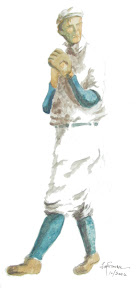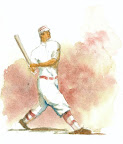In our modern Scots-invented world of bloviation, headlines and titles can't stand the heat of a literalist's kitchen.
That's why, when I got my copy of Sports Illustrated last week, I was taken aback by the headline on the cover. (Yes, I get a hard copy of Sports Illustrated. It apparently comes as part of the audio subscription I have with Major League Baseball. I didn't ask for it and wouldn't buy it otherwise. I even turn down the copy of the swimsuit issue, which probably disappoints the editors because they use their highest level of sports knowledge to produce this profound epic. But I digress.)

The headline on this week's issue of SI reads: The Best Game Ever. One of the subhead is "How John Unitas and Raymond Berry Invented the Modern NFL."
I'm no expert, but I know a little bit about the history of professional football in this country. I was alive in 1958 and remember listening to the Giants-Colts game on the radio in my room where I grew up in Nashville, Tenn. (It was on Sunday afternoon, and in my household at that time, we didn't watch television on Sunday.)
True, this was the first of an era of popularity of professional football that still has not run its course. And true, it was a great game with many great players. The stuff of legend, as they say. I don't quarrel with the assertion that it might have been the best game ever.
But really . . . to claim, as the subhead does, that a couple of players "invented" professional football is a bit over the top. It certainly doesn't qualify as being discrete or modest in the use of the language. In fact, it goes too far in the other direction by being splashy and overblow -- and by ultimately being wrong.
But this article, which concentrated far more on Raymond Berry than Johnny Unitas, is actually an excerpt from a forthcoming book, and it got me to thinking that this is not the first time that I have run into this "invention conceit." A quick search of Amazon reveals the following:
- Frank Deford, The Old Ball Game: How John McGraw, Christy Mathewson, and the New York Giants Created Modern Baseball
- Arthur Herman, How the Scots Invented the Modern World: The True Story of How Western Europe's Poorest Nation Created Our World & Everything in It
- Arthur DePalma, The Man Who Invented Fidel: Castro, Cuba, and Herbert L. Matthews of The New York Times
- Neal Gabler, An Empire of Their Own: How the Jews Invented Hollywood
- Andrew Wilson, Harold Robbins: The Man Who Invented Sex
- Andrew Lycett, The Man Who Created Sherlock Holmes: The Life and Times of Sir Arthur Conan Doyle
- Daniel Stashower, The Beautiful Cigar Girl: Mary Rogers, Edgar Allan Poe, and the Invention of Murder
The list could go on, and I'm sure you get the point.

These are probably all terrific books. I have read only one of these books: Frank Deford's book on John McGraw and Christy Mathewson. It was okay though in the end disappointing because Christy Mathewson died early and for some very wrong reasons. He was from all accounts a truly fine person and did not deserve his fate. (BSP alert: The watercolor of him at right can be found at First Inning Artworks.)
But nowhere in the book does Deford really make the case tht McGraw, Mathewson and the Giants invented modern baseball. How could he? It is a ludicrous argument to embark on in the first place.
By the same token, I'm pretty sure that the Scots did not invent the modern world. Don't get me wrong. I love Scotland. I lived their for several months once. At no time did I hear any Scot bragging about inventing the modern world. The Scots do brag about inventing golf. I'll give them that one.
Herbert Matthews, I'm confident, did not invent Fidel Castro. If he did, he has a lot to answer for. The Jews didn't invent Hollywood, Mary Rogers and Edgar Allen Poe didn't invent murder (that one goes to a guy named Cain) and Harold Robbins didn't invent sex. I know I'm on solid ground with that last one.
The only one I'm willing to concede is the last one: Arthur Conan Doyle probably did create Sherlock Holmes.
Because that's what authors do.
Updated May 4, 2008.


